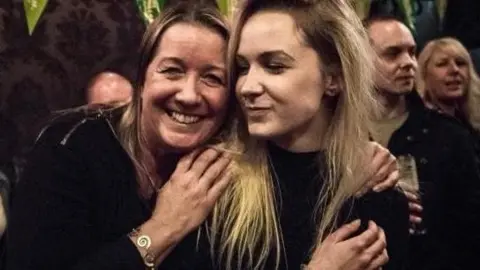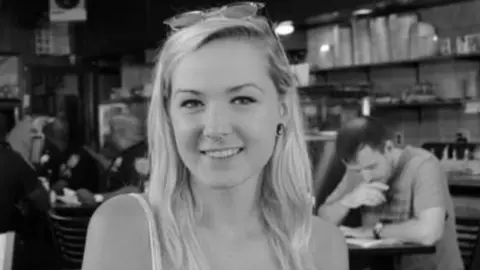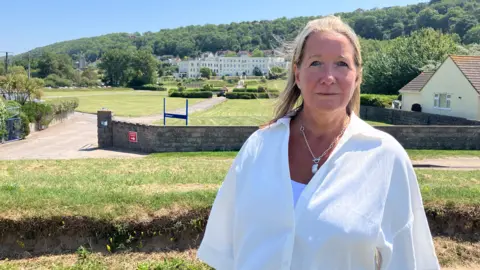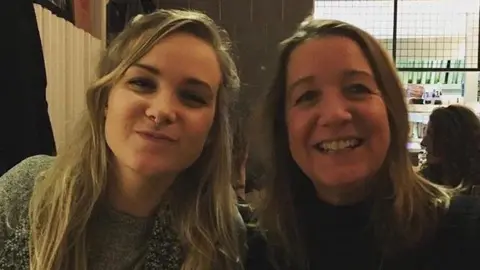'Staff missed chances to save my girl - I've lost faith'
 Family handout
Family handoutThe day before Lily Lucas died, staff at a psychiatric hospital saw her drink excessive amounts of water, smoothies and Coca-Cola quickly by midday - something a consultant later said she had never done before.
On that day, 8 September 2022, Lily was then monitored every 15 minutes for more than three hours at privately-run Milton Ward at Cygnet Hospital in Kewstoke, an inquest heard last year.
But the 28-year-old had only been seen through a window of a closed bedroom door which was not opened soon enough, as hours later she was found unresponsive.
Lily's mum, Mary Curran, said: "She [Lily] lay on the floor, on a hard floor, covered in her own vomit and faeces, and was left in that state until nearly 19:00 BST when they realised things were more serious than they thought."
The inquest heard she died the following day in the Bristol Royal Infirmary from cardiac arrest, caused by excessive fluid intake which was a consequence of her schizophrenia.
Mary, 60, is still haunted by Lily's care in her final weeks and told the BBC "no-one has been held to account".
"She was in a place where we trusted that she'd be looked after," she said.
"A place where she felt, we felt, she was safe and we could relax."
Cygnet said it has since made improvements, including staff training and increased permanent staffing.
 Family handout
Family handoutThe BBC understands Cygnet referred three nurses to the Nursing and Midwifery Council, but no action has been taken.
In May, the health and social care watchdog, the Care Quality Commission (CQC), concluded it could not launch a criminal investigation because of a "lack of evidence" linking "individual failures" back to Cygnet.
Mary described Lily as "fantastic".
"She was a bundle of fun and the absolute life and soul of our family. She was just larger than life," she said.
She believes Lily might still have been alive, if staff responsible for her had taken better care of her.
'Understaffed to unsafe levels'
Lily, from Malmesbury, Wiltshire, had also been diagnosed with complex post-traumatic stress disorder.
Her mental health worsened after a fall in Barcelona in 2017 - while celebrating her graduation as a mental health nurse from Bristol's University of the West of England.
She was then referred to the ward in June 2022 as an NHS patient under the Mental Health Act for its therapy and 24-hour care as a low secure unit, after years of care elsewhere.
Mary said Lily wanted to get better, and in her last social media post her daughter shared her dream of finishing treatment and travelling around Australia.

But in the days before her death, she was prescribed the antipsychotic drug, Clozapine. She then complained to staff of nausea, hot flushes, and feeling unwell. Her condition worsened from 7 September.
The inquest in April 2024 heard on 8 September staff watched her vomiting and defecating on the ward, and offered her her medication which she refused. Later a nurse was heard "sternly" telling Lily to stay in her room.
The ward manager admitted the unit was understaffed to "unsafe levels" on the day she collapsed, it was told.
The inquest jury concluded "gross failures" amounted to her neglect and there were "missed opportunities" to prevent her death. Clozapine was ruled out as a cause of death.
Mary said: "We felt that after a verdict like that, the hospital and the staff involved on the day would be held accountable."
She added the first she heard of Lily being unresponsive was hours later, at 22:00 when Lily was on route to hospital in an ambulance.
Staff 'lacked experience'
An NHS review of the Milton Ward, seen by the BBC, which was launched in response to Lily's death, found "very large usage of agency staff" and "extremely high staff turnover".
Staff lacked experience in mental health, and some agency nurses did not know how to "use 999", it found.
The review said: "The story of Milton Ward shows what happens when culture becomes closed, in an environment already challenged by external staffing constraints and a pandemic."
It added bad news "was not welcomed, and was often ignored", and the service was "failing in plain sight" which was not realised "to this level of dysfunction until a serious event occurred in the ward".
The BBC understands the NHS pulled its patients from the ward in 2023 due to concerns raised in the review, which Cygnet then closed. Cygnet has confirmed there are now no low-secure wards at the hospital.
Mary said a nurse had treated Lily "quite cruelly at times", revealing they once denied her tampons she needed, telling her to order them online.
That nurse was not working on the day Lily collapsed, but was disciplined internally by Cygnet, rather than a public tribunal.
'Somebody must be held accountable'
Mary's MP, Tonia Antoniazzi has spoken in Parliament to urge the government to prevent similar tragedies after hearing of Lily's "harrowing" death.
The Labour MP for the Gower said: "The thought that there are any more mums like Mary out there absolutely fills me with horror and I need to have the reassurances that actions are going to be taken," she said.
"We need to make sure that anybody's daughter, brother, sister, or friend that finds themselves in a vulnerable situation in a hospital… are safe and cared for properly.
"That is what has to come out of this for Lily's death and somebody needs to be held accountable for their actions."
Ms Antoniazzi also said Lily's death "really highlights" issues between private health hospitals, the NHS, and accountability, adding she has raised concerns with Health Secretary Wes Streeting.
'Improvements implemented'
A Cygnet spokesperson said they "referred all relevant matters to the appropriate and regulatory and professional bodies, and complaints were investigated and dealt with through the proper procedures".
"Following the inquest, we responded to findings and implemented improvements, including staff training, physical health monitoring, and staff engagement during observations.
"We also increased permanent staffing and reduced agency staff to ensure continuity and familiarity with patients' needs," they said.
In September 2022, agency staff made up about 50% of staff on shift, and at the time of the inquest in April 2024 it was approximately 20%.
Cygnet Hospital Kewstoke is rated as "Good" overall by the CQC.
The watchdog has the power to conduct criminal prosecutions if failures in care can be proved but said evidence around Lily's death "didn't meet the legal threshold required to proceed".
It added it may review the case if new evidence emerged.
 Family handout
Family handoutOn the day before she collapsed, Lily told Mary she had felt sick for days.
Mary told the BBC she suggested her daughter brushed her teeth again which might "help alleviate the nausea".
"To which she said, 'I haven't got a toothbrush or toothpaste'. We were utterly shocked by that," Mary said. It was their last conversation.
Following the inquest, Mary said she left a career in social care to challenge Cygnet and also because the "trauma of losing Lily had taken its toll".
Three years later, she said she had "lost faith in the system" she was once answerable to - but remains determined to fight for her daughter.
If you are suffering distress or despair, details of help and support in the UK are available at BBC Action Line.
Follow BBC Bristol on Facebook, X and Instagram. Send your story ideas to us on email or via WhatsApp on 0800 313 4630.
